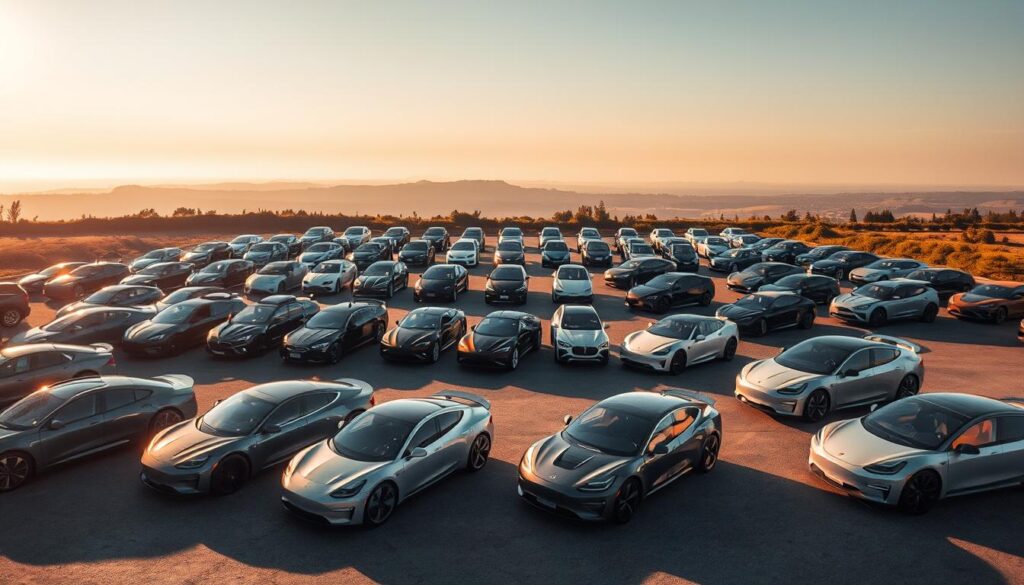The shift towards eco-friendly vehicles is transforming the automotive industry, with top electric vehicles leading the charge. As concern for the environment grows, consumers are increasingly turning to sustainable options.
Electric EV manufacturers are responding with innovative designs and technologies, making eco-friendly transportation more accessible than ever. The market is now filled with a variety of options, from sleek sedans to family-friendly SUVs.
As the demand for green transportation continues to rise, understanding the offerings of different electric car brands becomes crucial for making informed decisions.
Key Takeaways
- Top electric vehicles are changing the automotive landscape.
- Eco-friendly vehicles are becoming increasingly popular.
- EV manufacturers are innovating to meet the growing demand.
- The market now offers a wide range of electric vehicles.
- Sustainable automotive options are more accessible than ever.
The Current State of the Electric Vehicle Market
As we dive into 2023, the electric vehicle market is witnessing unprecedented expansion. This growth is driven by a combination of factors, including technological advancements, environmental concerns, and shifting consumer preferences.
Market Growth and Consumer Adoption Rates
The electric vehicle market has seen significant growth in recent years. According to recent statistics, EV sales have increased by over 50% in the past year alone. This surge is attributed to the rising awareness of environmental issues and the decreasing costs of battery technology.
| Year | EV Sales (in millions) | Growth Rate (%) |
|---|---|---|
| 2021 | 3.2 | 40 |
| 2022 | 4.8 | 50 |
| 2023 | 7.0 | 45 |
The adoption rates vary across regions, with countries like Norway and China leading the charge. In the United States, there’s also a notable increase in EV adoption, driven by government incentives and a growing charging infrastructure.
Key Drivers of EV Popularity in 2023
Several factors are driving the popularity of electric vehicles in 2023. Environmental concerns remain a top motivator, as consumers become more aware of the impact of fossil fuels. Additionally, technological advancements have improved the range and performance of EVs, making them more appealing to a wider audience.

Government policies and incentives are also playing a crucial role. Many countries are offering subsidies and investing in EV charging infrastructure, making it easier for consumers to switch to electric vehicles.
By understanding these drivers and trends, we can better grasp the current state of the electric vehicle market and its potential for future growth.
Leading Electric Car Brands Transforming the Industry
Leading electric car brands are revolutionizing the automotive industry with innovative models and technologies. The shift towards electric vehicles (EVs) is gaining momentum, driven by consumer demand, environmental concerns, and technological advancements.
Market Share Distribution Among Top Manufacturers
The electric vehicle market is becoming increasingly competitive, with several brands vying for dominance. According to recent data, the top manufacturers have a significant share of the market.
| Manufacturer | Market Share (%) |
|---|---|
| Tesla | 23.4 |
| Volkswagen Group | 14.2 |
| Hyundai/Kia | 10.5 |
| General Motors | 8.1 |
| Ford | 6.3 |
Market Share Insights: Tesla remains the leading electric car brand, but competitors are closing the gap with innovative models and aggressive marketing strategies.
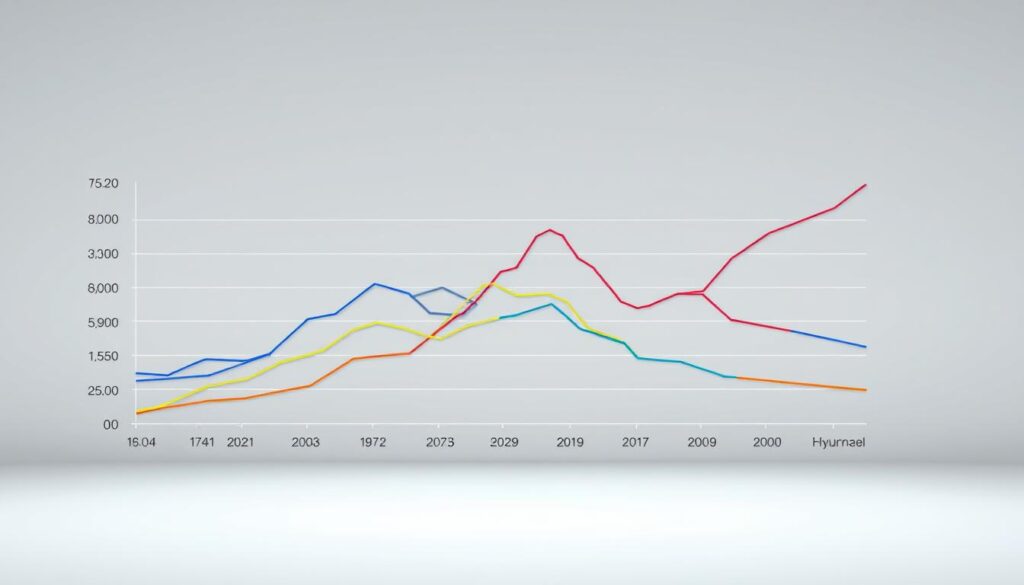
Recent Sales Performance and Consumer Preferences
Recent sales data indicates a strong preference for electric vehicles, with many consumers opting for models that offer a combination of range, performance, and affordability.
The top-selling electric vehicles include models like Tesla’s Model 3, Hyundai’s Kona Electric, and the Volkswagen ID.4. These models have seen significant sales growth, driven by consumer preferences for longer range and faster charging times.
Consumer preferences are also shifting towards SUVs and crossovers, with many manufacturers responding by expanding their offerings in these categories. The popularity of electric SUVs like the Tesla Model Y and Hyundai Ioniq 5 underscores this trend.
Tesla: The Dominant Force in Electric Vehicles
Tesla continues to lead the electric vehicle market with its innovative models and technological advancements. The company’s commitment to sustainability and innovation has made it a household name in the EV sector.
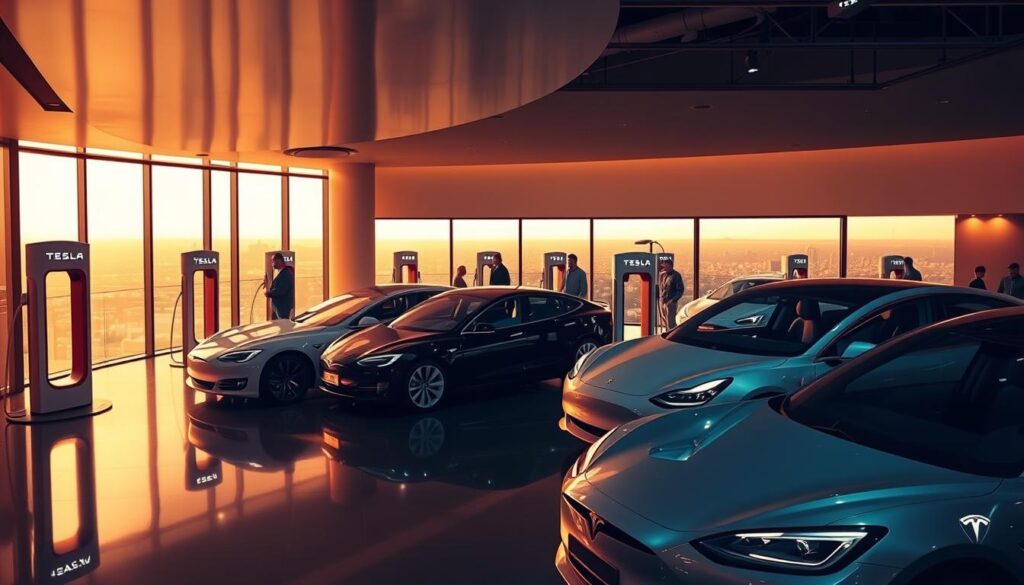
Model S, 3, X, and Y: Current Sales and Updates
Tesla’s current lineup includes the Model S, Model 3, Model X, and Model Y, each contributing significantly to the company’s sales. The Model 3 remains one of the best-selling electric vehicles globally, thanks to its affordability and impressive range. The Model S and Model X continue to be popular among luxury EV buyers, offering unparalleled performance and features.
Recent updates have focused on improving range and performance. For instance, the Model S Plaid offers exceptional acceleration, making it one of the quickest production cars available. Tesla’s ability to consistently update and improve its models through over-the-air updates has been a significant factor in its success.
Cybertruck Production News and Roadster Development
Tesla’s Cybertruck has generated significant buzz since its unveiling. Production is underway, with the company working to meet the high demand for this futuristic pickup truck. The Cybertruck’s unique design and capabilities, such as its robust towing capacity, have made it a highly anticipated vehicle.
Additionally, Tesla is developing the next-generation Roadster, which promises to be an extraordinary supercar with unprecedented acceleration and range. While details are still limited, the anticipation surrounding the Roadster’s release is building, with expectations of it further solidifying Tesla’s position in the high-performance EV market.
Tesla’s Latest Technological Breakthroughs
Tesla is at the forefront of EV technology, with significant advancements in battery technology and autonomous driving. The company’s Full Self-Driving (FSD) capability continues to evolve, offering enhanced safety features and paving the way for future autonomous vehicles.
Moreover, Tesla’s innovations in battery production, including the development of the 4680 battery cell, are expected to improve energy density and reduce production costs. These technological breakthroughs are crucial in making EVs more accessible and appealing to a broader audience.
Ford’s Accelerating Electric Ambitions
As the electric vehicle market continues to grow, Ford is accelerating its ambitions. The company is making significant investments in electric vehicle technology, with a focus on expanding its EV lineup to meet increasing consumer demand.
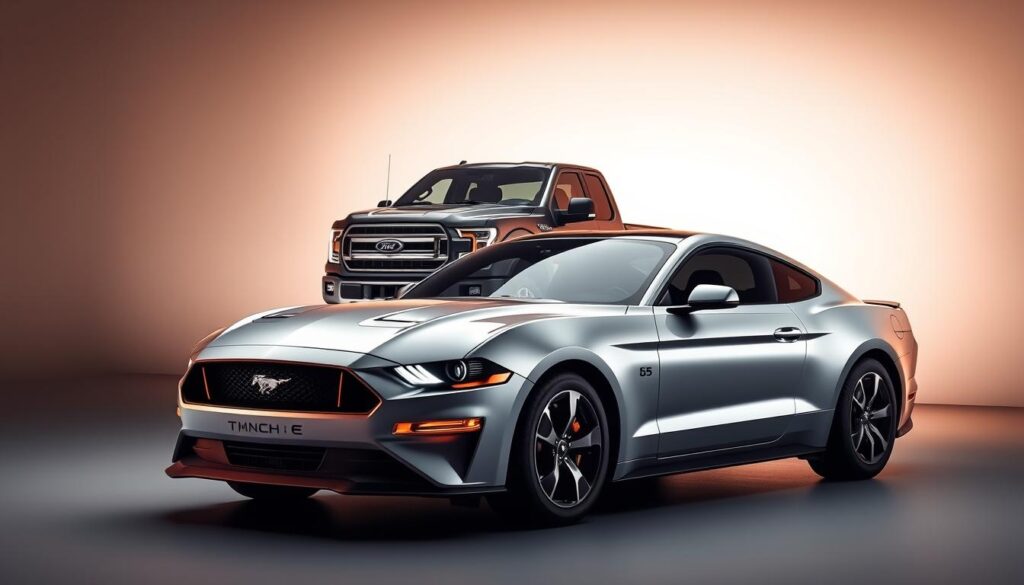
Sales Success and New Features
The Mustang Mach-E has been a standout model for Ford, with impressive sales figures and positive consumer reception. The Mach-E has not only bolstered Ford’s EV sales but has also attracted a new demographic to the brand. Recent updates to the Mach-E include enhanced software features and expanded trim options, further increasing its appeal.
Ford continues to innovate with the Mach-E, introducing new features such as advanced driver-assistance systems and improved infotainment technology. These enhancements have solidified the Mach-E’s position in the competitive EV market.
Production Expansion and Market Impact
The F-150 Lightning is another key model driving Ford’s electric ambitions. With its impressive capabilities and innovative features, the F-150 Lightning is poised to make a significant impact on the EV truck market. Ford has ramped up production of the F-150 Lightning, with plans to scale up manufacturing to meet growing demand.
The F-150 Lightning’s market impact is expected to be substantial, given the popularity of the F-150 brand and the vehicle’s compelling features, including its impressive range and advanced technology.
| Model | Sales (2023) | Notable Features |
|---|---|---|
| Mustang Mach-E | 50,000+ | Advanced driver-assistance systems, premium interior |
| F-150 Lightning | 20,000+ | Impressive range, innovative tech, Pro Power Onboard |
Ford’s commitment to expanding its electric vehicle offerings is evident in its production plans and sales performance. As the company continues to innovate and improve its EV lineup, it’s likely to remain a major player in the rapidly evolving electric vehicle market.
General Motors’ Multi-Brand EV Strategy
With a commitment to electrification, General Motors is leveraging its multi-brand portfolio to drive the future of transportation. This approach allows the company to cater to a wide range of consumers, from budget-friendly options to luxury vehicles, all under the umbrella of electric mobility.
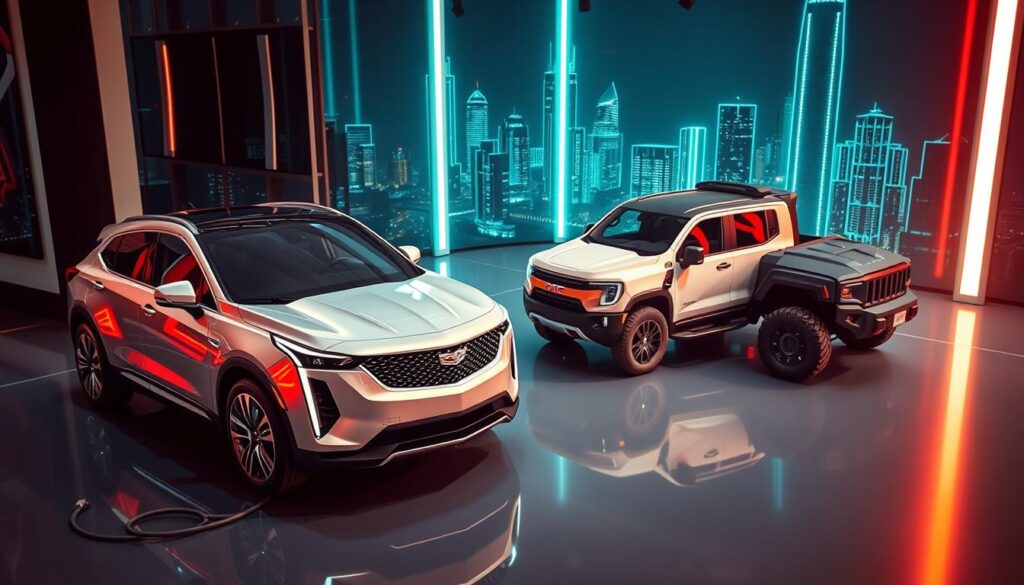
Chevrolet Bolt EV and EUV: Recent Updates
The Chevrolet Bolt EV and EUV have been a cornerstone of General Motors’ EV strategy, offering an affordable and feature-rich option for consumers. Recent updates have focused on enhancing the vehicle’s range and performance, making it an even more compelling choice in the EV market. As Mark Reuss, General Motors President, noted, “The Chevrolet Bolt is a key component of our EV strategy, and we’re committed to continuous improvement.”
GMC Hummer EV: Delivery Status and Customer Reception
The GMC Hummer EV has garnered significant attention for its unique blend of off-road capability and electric performance. As deliveries continue to ramp up, customer reception has been overwhelmingly positive, with many praising the vehicle’s “insane torque and advanced technology.” General Motors is working to expand production to meet the growing demand for this innovative EV.
Cadillac Lyriq and Upcoming Celestiq
Cadillac is pushing the boundaries of luxury EVs with the Lyriq, which has received accolades for its sleek design and advanced features. The upcoming Celestiq is expected to further elevate the brand, offering an ultra-luxurious EV experience. As Cadillac continues to expand its EV lineup, the brand is poised to challenge the status quo in the luxury automotive segment.
General Motors’ multi-brand EV strategy is a testament to the company’s commitment to a sustainable future. By offering a diverse range of electric vehicles across its brands, General Motors is well-positioned to meet the evolving needs of the market.
Volkswagen Group’s Global Electric Push
As part of its global electric push, Volkswagen Group is making significant investments in EV technology. This strategic move is aimed at expanding its electric vehicle lineup worldwide, catering to the growing demand for sustainable and environmentally friendly transportation options.
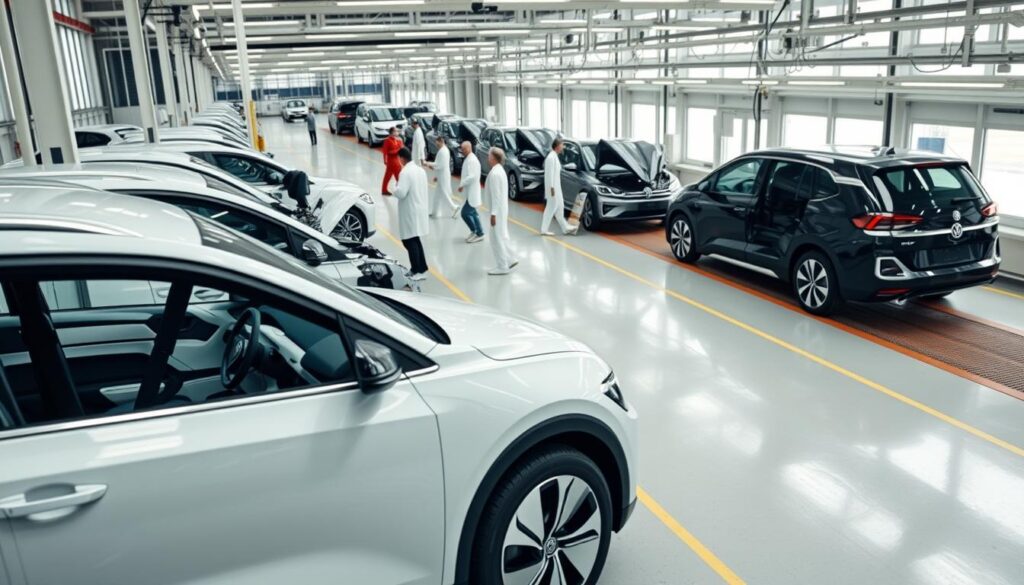
ID.4: US Production and Market Performance
The ID.4 is a crucial model in Volkswagen’s electric push, offering a blend of performance, range, and affordability. Production in the US is a significant step towards reducing reliance on imports and meeting the growing demand for electric vehicles in the American market.
Key features of the ID.4 include:
- A range of up to 275 miles on a single charge
- Fast charging capability, allowing for an 80% charge in under 30 minutes
- Advanced safety features, including adaptive cruise control and lane-keeping assist
Audi e-tron and Porsche Taycan: Luxury EV Developments
Audi and Porsche, both subsidiaries of Volkswagen Group, are making significant strides in the luxury electric vehicle segment. The Audi e-tron and Porsche Taycan are showcasing the group’s capability in producing high-performance, premium EVs.
The Audi e-tron offers:
- A stylish and spacious interior, with advanced infotainment systems
- Robust performance, with the e-tron GT model producing over 800 horsepower
The Porsche Taycan, on the other hand, is renowned for its exceptional performance, with models like the Taycan Turbo S delivering:
- 0-60 mph in under 2.4 seconds
- A range of up to 227 miles on a single charge, depending on the model and driving conditions
Both models are contributing to Volkswagen Group’s global electric push, offering consumers a range of choices in the luxury EV segment.
Hyundai and Kia: Korean Innovation Leaders
In the rapidly evolving electric vehicle sector, Hyundai and Kia stand out with their commitment to innovation and sustainability. These two Korean automotive giants have been at the forefront of the EV revolution, offering a range of models that not only meet but exceed consumer expectations.
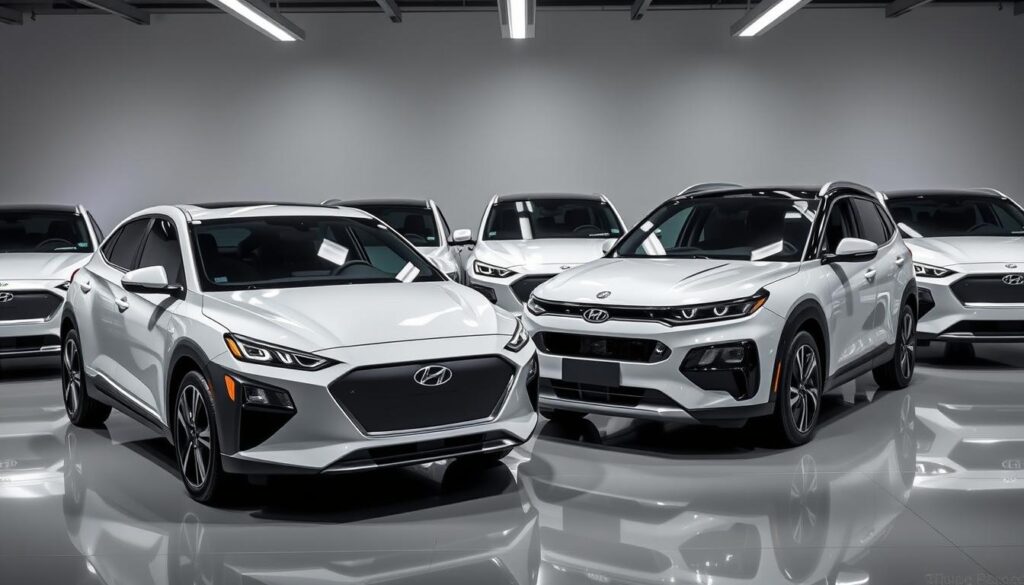
Award-Winning Designs: Hyundai Ioniq5 and Kona Electric
The Hyundai Ioniq5 has garnered significant attention for its futuristic design and advanced technology. It has won numerous awards, including the prestigious 2022 World Car of the Year award, marking a significant milestone for Hyundai’s EV division. The Ioniq5’s success can be attributed to its innovative design, spacious interior, and impressive range.
The Kona Electric, another popular model from Hyundai, has also received accolades for its design and performance. It offers a compelling blend of style, range, and affordability, making it a favorite among EV enthusiasts.
Sales Performance and New Features: Kia EV6 and Niro EV
Kia’s EV6 has been a game-changer in the EV market, thanks to its striking design, advanced technology, and impressive performance. It has not only captured the attention of consumers but has also received critical acclaim, including being named one of the Top 3 Finalists for the 2022 European Car of the Year. The EV6’s success has contributed significantly to Kia’s growing presence in the EV market.
The Niro EV, another model from Kia, continues to be a popular choice among consumers looking for a crossover EV. With its updated features and design enhancements, the Niro EV has seen a boost in sales, further solidifying Kia’s position in the EV segment.
Both Hyundai and Kia are leveraging their successes in the EV market to drive further innovation and growth. Their commitment to electric vehicles is not only reshaping their brand identities but is also contributing to the global shift towards more sustainable transportation options.
Rivian: America’s Electric Adventure Vehicle Startup
As an innovative American startup, Rivian is pushing the boundaries of electric adventure vehicles, offering a fresh perspective in the EV market. With a focus on adventure and sustainability, Rivian has garnered significant attention for its models and partnerships.
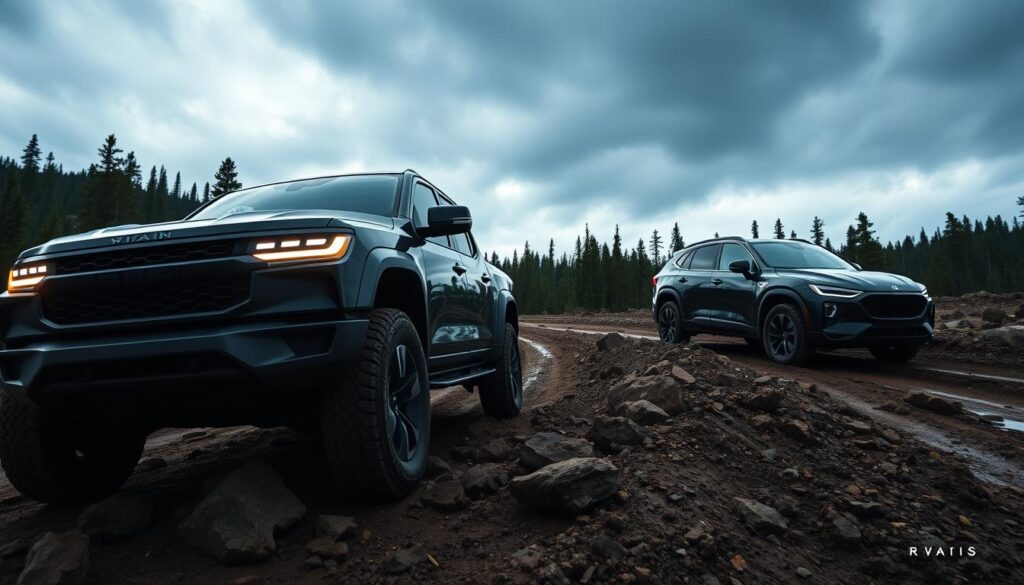
Production Ramp-Up News
Rivian’s R1T pickup and R1S SUV are at the forefront of its product lineup, showcasing the company’s ability to blend adventure capability with electric vehicle technology. The production ramp-up of these models has been a significant focus for Rivian, with the company working to meet growing demand and expand its manufacturing capabilities.
The R1T, with its impressive torque and off-road capabilities, has been a particularly strong model for Rivian, appealing to those looking for an adventurous yet sustainable vehicle option. Meanwhile, the R1S SUV offers a blend of performance and practicality, further enhancing Rivian’s appeal in the electric vehicle market.
Amazon Delivery Van Progress and Challenges
Rivian has also made significant strides in its partnership with Amazon through the development of the Amazon Delivery Van. This electric van is a key component of Amazon’s efforts to reduce its carbon footprint and achieve its goal of net-zero carbon emissions by 2040.
While Rivian faces challenges in scaling production to meet Amazon’s demands, the partnership represents a significant opportunity for Rivian to showcase its capabilities in the commercial vehicle segment. The progress on the Amazon Delivery Van has been closely watched, with expectations high for its impact on the future of logistics and delivery services.
Lucid Motors: Challenging the Luxury EV Segment
With its cutting-edge technology and sleek designs, Lucid Motors is challenging established players in the luxury EV market. The company’s flagship model, the Lucid Air, has garnered significant attention for its impressive performance and luxurious features.
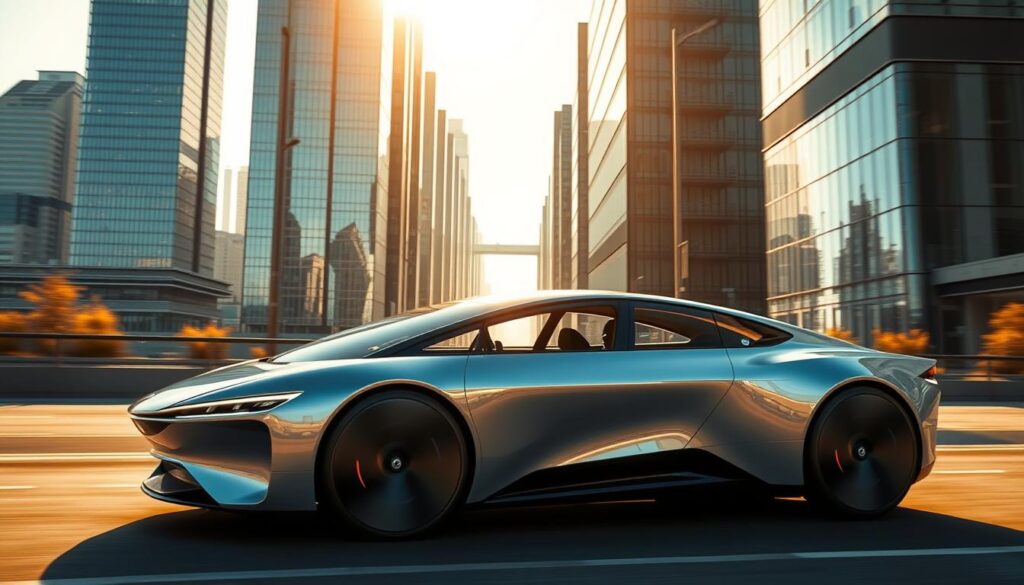
Lucid Air: Recent Accolades and Performance Metrics
The Lucid Air has received widespread acclaim for its exceptional performance metrics. Some of its notable features include:
- A range of up to 520 miles on a single charge
- A 0-60 mph acceleration time of just 2.5 seconds
- A top speed of 168 mph
- A luxurious interior with premium materials and advanced technology
Recent accolades for the Lucid Air include being named the 2022 MotorTrend Car of the Year and receiving a 5-star overall safety rating from the National Highway Traffic Safety Administration (NHTSA).
Production Challenges and Future Model Announcements
Despite its success, Lucid Motors has faced production challenges, including supply chain disruptions and manufacturing ramp-up issues. However, the company remains committed to expanding its production capacity and introducing new models to the market.
Some of the key future model announcements from Lucid Motors include:
- The Lucid Gravity, a luxury electric SUV expected to debut in 2024
- A mid-size luxury EV, potentially priced lower than the Lucid Air
As Lucid Motors continues to innovate and expand its product lineup, it is poised to remain a significant player in the luxury EV segment.
Affordable Electric Car Brands Gaining Traction
As the electric vehicle market continues to expand, affordable options are becoming increasingly popular among consumers. This shift is driven by both consumer demand for more budget-friendly choices and advancements in technology that make electric vehicles (EVs) more accessible.
Chevrolet, Nissan, and Hyundai’s Entry-Level Options
Several major automakers are now offering entry-level electric vehicles that are more affordable for the average consumer. Chevrolet’s Bolt EV, for example, has been a staple in the affordable EV market, offering a range of over 250 miles on a single charge. Nissan’s Leaf is another popular option, known for its reliability and affordability. Hyundai’s Kona Electric and Ioniq Electric models are also gaining traction, providing consumers with a variety of choices.
These entry-level EVs are not only more affordable upfront but also offer significant savings on fuel and maintenance over time. They are an attractive option for those looking to transition to electric vehicles without breaking the bank.
- Chevrolet Bolt EV: Over 250 miles of range, competitive pricing.
- Nissan Leaf: Reliable, affordable, and widely available.
- Hyundai Kona Electric and Ioniq Electric: Stylish, feature-rich, and affordable.
Price Reductions and Value Propositions
In addition to introducing new entry-level models, many manufacturers are also reducing prices on existing EVs to make them more competitive with gasoline-powered vehicles. These price reductions, coupled with government incentives, are making electric vehicles more appealing to a wider audience.
The value proposition of electric vehicles is further enhanced by lower operating costs. EVs require less maintenance than traditional vehicles and are generally cheaper to “fuel” since electricity is often less expensive than gasoline.
Key benefits of affordable EVs:
- Lower upfront costs, making EVs more accessible.
- Significant savings on fuel and maintenance.
- Government incentives that further reduce the cost.
As the market continues to evolve, we can expect to see even more affordable electric vehicle options, making sustainable transportation more accessible to everyone.
Government Policies Reshaping the Electric Vehicle Landscape
As the world shifts towards more sustainable transportation options, government policies are increasingly influencing the electric vehicle landscape. The electric vehicle (EV) market is experiencing rapid growth, driven by a combination of technological advancements, environmental concerns, and supportive government initiatives.
Government policies at both the federal and state levels are playing a crucial role in shaping the EV industry. These policies range from incentives for consumers to invest in electric vehicles to investments in EV charging infrastructure.
Inflation Reduction Act Impact on EV Manufacturers
The Inflation Reduction Act (IRA) has been a significant piece of legislation impacting the EV landscape. It includes provisions that offer tax credits to consumers who purchase electric vehicles, with certain conditions related to the vehicle’s manufacturing location and battery sourcing. This has led to a surge in demand for EVs that qualify for these credits. Manufacturers are adjusting their production strategies to ensure their vehicles meet the IRA’s requirements, thereby benefiting from the increased consumer demand.
According to a recent statement by the Secretary of Energy, “The Inflation Reduction Act is not just about reducing inflation; it’s about reshaping our economy and investing in a cleaner future.” This underscores the administration’s commitment to using policy to drive the adoption of cleaner technologies like EVs.
State-Level Incentives and Infrastructure Investments
In addition to federal policies, many states are implementing their own incentives to promote EV adoption. These can include rebates for EV purchases, exemptions from certain fees, and investments in charging infrastructure. States like California and New York are leading the way with ambitious targets for EV adoption and comprehensive plans to support the necessary infrastructure.
A key aspect of state-level initiatives is the development of EV charging infrastructure. States are allocating funds to build out charging networks, particularly along highways and in underserved communities. This not only supports current EV owners but also helps alleviate range anxiety for potential buyers, further driving adoption.
The Future Roadmap for Electric Car Brands
As we look to the future, electric car brands are poised to unveil innovative models that promise to reshape the industry. The next few years will be crucial as manufacturers not only introduce new electric vehicles but also continue to push the boundaries of battery technology, enhancing range and performance.
Announced Models Coming in 2023-2024
Several electric car brands have announced new models expected to hit the market in 2023 and 2024. For instance, Tesla’s Cybertruck is anticipated to start production soon, promising a futuristic design and impressive performance metrics. Similarly, Rivian is ramping up production of its R1T pickup and R1S SUV, both of which have garnered significant attention for their capabilities and design. As
“The electric vehicle market is rapidly evolving, with new models offering consumers more choices than ever before.”
Other brands like Ford with its Mustang Mach-E and F-150 Lightning are also expanding their electric offerings, providing consumers with a wider range of options.
Battery Technology Breakthroughs and Range Improvements
Advancements in battery technology are crucial for the future of electric vehicles, directly impacting their range and performance. Recent breakthroughs in battery technology have led to significant range improvements, making electric vehicles more viable for a wider audience. For example, new battery chemistries and designs are being developed to increase energy density, reduce charging times, and lower costs. As a result, future electric models are expected to offer longer ranges and better performance, making them more competitive with their gasoline-powered counterparts.
Conclusion
The electric vehicle market is experiencing rapid growth, driven by increasing consumer adoption rates and advancements in technology. As we’ve explored, leading electric car brands are transforming the industry with innovative models and sustainable practices.
Tesla continues to dominate the EV market, while other brands like Ford, General Motors, and Volkswagen Group are accelerating their electric ambitions. Hyundai and Kia are also making significant strides, offering award-winning designs and competitive pricing.
The future of electric vehicles looks promising, with announced models coming in 2023-2024 and battery technology breakthroughs expected to improve range and performance. Government policies, such as the Inflation Reduction Act, are also reshaping the EV landscape, providing incentives for manufacturers and consumers alike.
As the EV market continues to evolve, it’s clear that electric car brands will play a crucial role in shaping the future of transportation. With their commitment to sustainability and innovation, these brands are poised to drive the industry forward, making electric vehicles more accessible and appealing to a wider audience.

